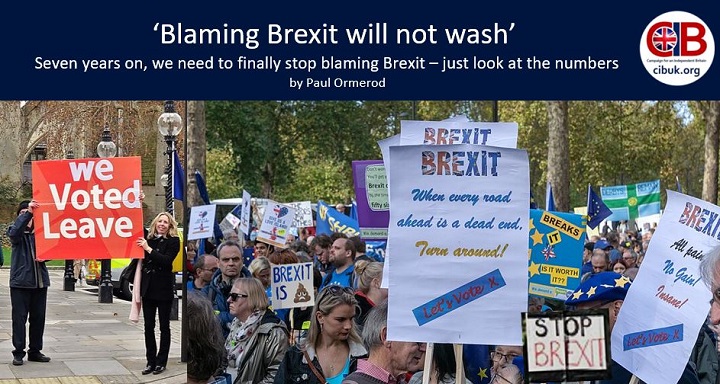‘Blaming Brexit will not wash’

It has become an article of faith among the mainstream establishment to blame Brexit for Britain’s recent economic woes and to argue that the UK would have been better off remaining within the EU.
As we have demonstrated in countless affiliated articles, and research papers from a wide range of respected economists, not only has the UK outperformed the EU across a range of economic activity, but any attempt to extrapolate an adverse ‘Brexit effect’ on the UK economy is almost impossible to establish, given the multitude of external shocks which have hit not only the UK but developed economies all over the world including Europe.
As 2023 draws to a close, it is worth reiterating that point, and we are pleased to re-publish an article by Paul Ormerod, economist at Volterra Partners which provides a comparative analysis between the UK’s economic performance post-Brexit and that of the eurozone.
Seven years on, we need to finally stop blaming Brexit – just look at the numbers
by Paul Ormerod
Two quite contradictory messages have been given about Brexit over the past few days or so. First, Makoto Uchida, the chief executive of Nissan, a company originally very critical about the UK’s exit from the EU, pronounced that the impact of Brexit on its UK operations is now negligible. He urged the country to be more optimistic about its prospects. A £2bn upgrade of the firm’s Sunderland plant was announced, confirming the UK as Nissan’s main operational base in Europe. Hot on the heels of Mr Uchida, Ursula von der Leyen, the European Commission President, claimed that her generation of politicians had “goofed up” over Brexit. The upcoming one should fix it and put Britain firmly on the path to rejoining.
One thing we know for certain is that the short-term forecasts put out by the Remain campaign during the referendum were shown to be spectacularly wrong. Following the vote in June 2016, by the end of that year the UK was meant to be in a deep recession and unemployment was going to rise by half a million. In fact, in the second half of 2016 GDP grew at a respectable annual rate of two per cent, and unemployment fell.
But how do we stand now, over seven years after the decision to leave?
The estimates of GDP published by the OECD in Paris tell a revealing story. Between the second quarter of 2016 and the most recent figure for the third quarter of this year, the British economy only grew by 9.1 per cent.
The figure, amounting to not much more than one per cent a year, is disappointing. This is why both Rishi Sunak and Keir Starmer have placed the aim of raising the growth of both output and productivity centre stage in their policy objectives.
In Spain, however, growth over the same period was a bit less, at 8.3 per cent. In both France and Italy it was even lower, at 5.5 and 5.3 per cent respectively. Perhaps Germany, the poster country for many Remainers, can alter the story? But no. GDP there rose by just 6.2 per cent.
The manufacturing lobby makes a lot of noise, almost portraying Brexit as a catastrophe for the sector. The positive pronouncements of companies like Nissan do not seem to dampen the relish and enthusiasm with which this narrative is set out.
But it is Germany rather than the UK where manufacturing has performed really badly since Brexit. Again, using OECD data, here in the UK output has grown by 7.6 per cent. True, lower than the economy as a whole. But in Germany, manufacturing output is actually six per cent lower than it was in the first half of 2016.
The American economy offers a fairly sharp contrast. From the first half of 2016, GDP in the US has risen by 18.2 per cent, a respectable annual rate of some 2.4 per cent.
An even better performance has been registered by Poland. Since the Brexit vote, the Polish economy has grown by 25.6 per cent. This annual growth rate of over three per cent would go a long way to solving the problems with the public finances which face the British government, whichever party is in power, both now and after the election.
Of course, countries like Poland are still in the phase of playing catch-up with Western economies after spending decades in the centrally planned Soviet bloc. But they are carrying this out with admirable levels of entrepreneurial drive which we would do well to emulate.
What is abundantly clear is that there are no real lessons to be learned from the longer standing member countries of the EU. Since Brexit, the UK has outperformed them.
Please support our work:
About the author:
Paul Ormerod is an economist at Volterra Partners and honorary professor at the Alliance business school, University of Manchester. This article was originally published at City AM: Seven years on, we need to finally stop blaming Brexit – just look at the numbers (cityam.com).
We are grateful to our affiliate Briefings for Britain for their kind permission to republish this article.
Main image: Montage © CIBUK.Org 2024





